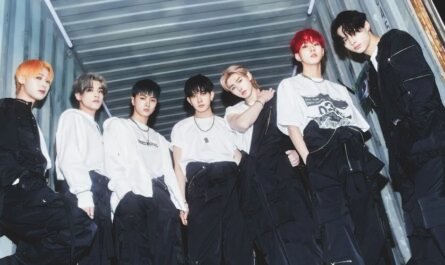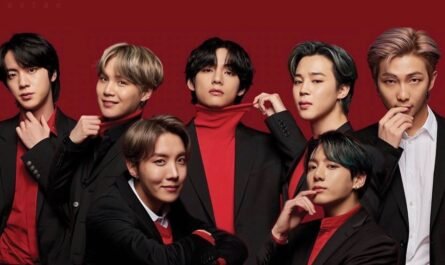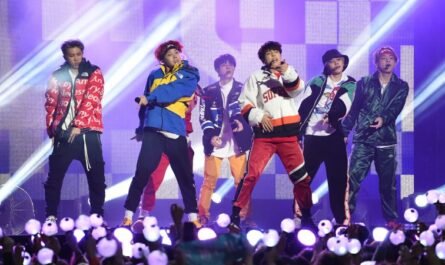fandom economy that competes with individualization and differentiation
“Hyunjin, what are you doing?”
A smile as bright as a lit cell phone screen appeared on the reporter’s face. How long has it been since your name called me so kindly? I hurriedly unlocked my phone and checked the incoming messages. The sender of the message is Junho of the idol group 2 PM. “It’s working. you are?” Another news from Junho arrived within a minute of sending a reply with a fluttering heart. “I’m doing great things. Thank you always.”
A pleasant conversation with 2PM’s Junho was made through the private message service ‘DearU bubble.’ Junho’s message is sent to all users who subscribe to Junho’s bubble account. It’s a ‘many one-on-one chats,’ but in a chat window decorated as if you’re talking with Junho alone, “What are you doing?” When you receive a small message such as “It’s raining,” it feels like talking to a friend. Junho’s just-taken ‘selfie’ or video that is received from time to time is a bonus.
Dear You Bubble, which started service in February last year, is a service launched by Dear You, a subsidiary of SM Entertainment. It has signed contracts with 15 domestic entertainment agencies, including JYP Entertainment and FNC Entertainment, and is providing services to a total of 164 entertainers. For only 4,500 won a month, you can receive messages sent by celebrities, which is popular among fans. It has more than 1 million subscribers, of which 72% are global users. ‘Dear You, which serves the Dear You bubble, recorded 13 billion won in sales in 2020, an increase of more than 600% compared to the previous year, and earned more than half of last year’s annual sales (8.9 billion won) in the first quarter of this year alone. It posted an operating profit of 3.2 billion won in the first quarter, recording a profit in the first quarter in four years of establishment. Dear, You are preparing for an IPO in the second half of the year.
The economic effect induced by ‘fandom,’ which was considered a subculture of youth, grows, a new business based on various intellectual property rights (IP) such as voices, characters, and performances of celebrities with an intense fandom is being tried. The current fandom economy is different from the past when celebrities were only used as advertising models. ‘Economy Chosun’ analyzed emerging new fandom business trends with three points.
- ‘Only for me’ star
The Dear You bubble is not the only attempt at personalization and differentiation in the fandom economy. The core contents’ Private Message’ and ‘Private Call’ services of UNIVERSE, a K-pop entertainment platform released by NCsoft in February of this year, are also represented. Private Call goes one step further than messaging and provides call service with celebrities. However, you will be talking to the AI recorded with the voice of a star, not an actual celebrity. When the user sets the desired call time, celebrity’s tone, and conversation topic, it receives calls at the scheduled time.
The entertainment tech platform ‘STARI’ is also a business case that reflects the fan’s desire to close the distance and communicate with celebrities who feel far away. When a fan requests a story they want to hear from a star and pays the amount, it provides a service that creates and sends the celebrity’s reply as a video letter file. Fans who have seen the video of the star calling their name and giving warm words will feel closer to the gorgeous celebrity on stage.
Ha Jae-Geun, a cultural critic, said, “Fans have a kind of ‘fantasy’ in which they want to have a more human and intimate relationship than just one of the stars and fans. This will strengthen the loyalty of the fandom and lead to greater profits.”
2. ‘Always with you’ star
EXO’s singing voice is familiar. However, I wonder what EXO’s vocalist will be like when they tell you the weather and read a book. This is the background to the birth of a service that satisfies the desire of fans to be with celebrities in every nook and cranny of their daily life.
A representative example is the ‘NUGU celeb’ smart speaker released by SM Entertainment in partnership with SK Telecom. You can listen to the voice guidance of artificial intelligence (AI) services with the voices of three K-pop stars: EXO’s Baekhyun, Red Velvet’s Joy, and NCT’s Taeyong. On the Internet, live reviews of AI speakers respond to the user’s words ‘I love you with the voice of a celebrity follow. In May, ‘Hive Edu,’ a subsidiary of following to which BTS and others belong, introduced an audio personalization service technology in which AI learned BTS’s voice plays. Ayame and message of support. BTS’s synthesized sound source is provided with Hive Edu’s Korean language learning materials.
Naver Audio Clip is getting a good response by preparing a corner called ‘Celebrity Audiobook.’ An audio file of a book read each by Shownu of the idol group MONSTA X and Hani of EXID will be provided. Astrid Lindgren’s ‘My Name is Pippi Longstockings,’ read by Hani, garnered more than 170,000 views. Although it is the same pager series, it is seven times more than the 24,000 views of the fairy tale ‘Pippi doesn’t want to become an adult’ read by a professional voice actor.
3. ‘I am making’ a star.
Fans’ dissatisfaction with goods (celebrity-related products) that are always out of stock, and concerts that are not enough even if held every day, are increasing. This is why startups that have seized business opportunities in the supply and demand gap between entertainment agencies and fandoms are on the road to success.
‘Makestar,’ a platform that brokers the fandom of entertainment agencies and K-pop stars, has recruited more than 1.3 million members from 230 countries worldwide within five years of its establishment. It collaborates and acts on behalf of small and medium-sized agencies that lack funds and workforce to receive crowdfunding from fans and plan goods or fan meetings, from financing to event production and delivery. It’s good that the agency can quickly respond to the needs of fans and carry out more profitable activities, and it’s good that fans can access more of their favorite star’s content. The mini-album production project of solo singer Jung-min from the idol group Boyfriend achieved the target amount within two weeks of starting, and the album production was completed. Makestar also attracted 6 billion won in investment from Korea Development Bank and Altos Ventures in February of this year. The accumulated investment so far has reached 116 billion won.
Some startups make the fan’s dream of ‘I want to see their favorite celebrities’ performances come true—my Music Taste (MMT). By predicting demand and planning performances based on big data, MMT has changed the performance market, centered on entertainment agencies, into a consumer (fandom) oriented one. The main customers are overseas fans who want to see their favorite K-pop stars in their home countries. Idol groups such as MONSTA X and SEVENTEEN performed successfully in countries worldwide, including Southeast Asia and Europe, through MMT. Last year, when face-to-face performances were challenging due to the novel coronavirus infection (COVID-19), they found a breakthrough by broadcasting live online concerts such as the idol group Lovelyz.
It resulted from reading the hearts of fans who wanted to actively produce and consume star content without waiting for the company’s decision.











